September 2022
By Linda Churchill, Head Gardener
Our philosophy from the Garden’s inception has been that we value the whole environment in which our Garden exists, including the plants, animals, air, water, soil, microbial life, and of course humans. We believe our garden plantings, maintenance, and activities should always add to, never subtract from, the overall well-being of the environment both within and outside of our Garden boundaries. Therefore we choose to not use pesticides (or other chemicals) in the maintenance of the Garden which may cause collateral damage to any parts of the whole environment.
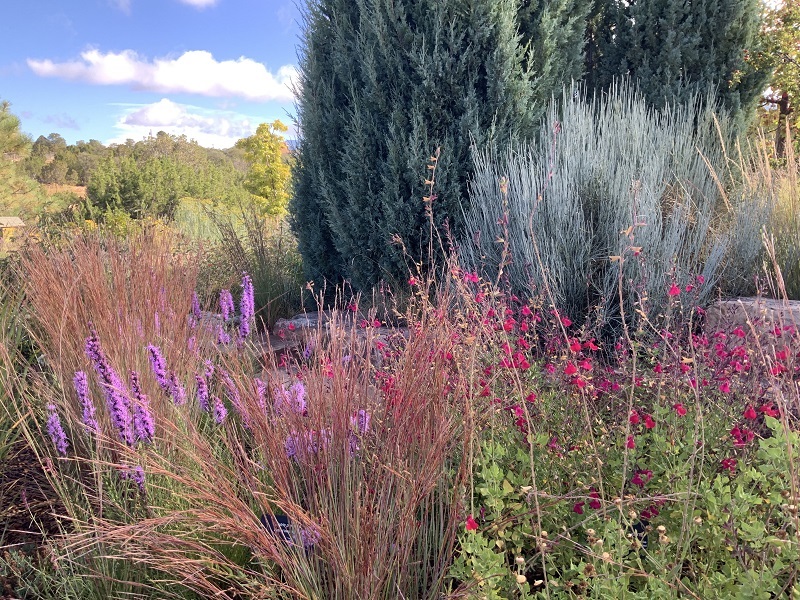
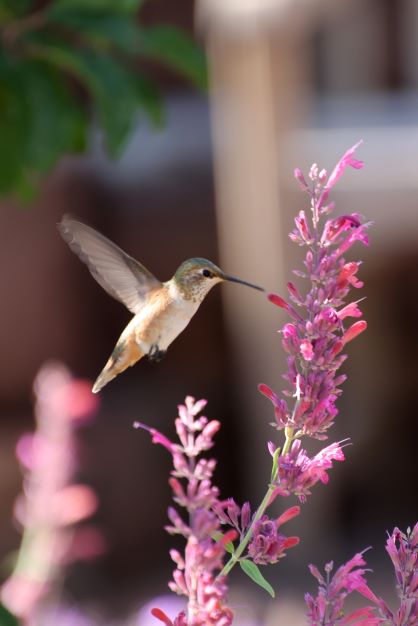
Photo by Master Naturalist volunteer, Toby Kessler
Our desire to be pesticide-free means we encourage environmental wellness in all facets of our Garden practices, beginning with planting design and appropriate plant selection. In all of our gardens we have chosen to use environmentally adapted plants so we do not need to take extraordinary measures to ensure plants will succeed in our sometimes challenging climate. All gardens include at least some native plants, and some of our gardens are mainly or wholly native, so we can help support the full range of plant, animal, and microbial life that helps to create an overall healthy environment.
Plant selections are made with disease and pest resistance in mind, as well as drought resistance and climate hardiness, to minimize the need for pesticides. For example, our collection of elms are cultivars bred for heat and drought tolerance and for resistance to elm leaf beetles, Japanese beetles, Dutch elm disease, and phloem necrosis. Fruit trees in our orchard collection were chosen not only for the flavor and appeal of their fruit, but also for their adaptation to our climate and soils and for their resistance to fireblight, a disease often found in trees in nearby neighborhoods.
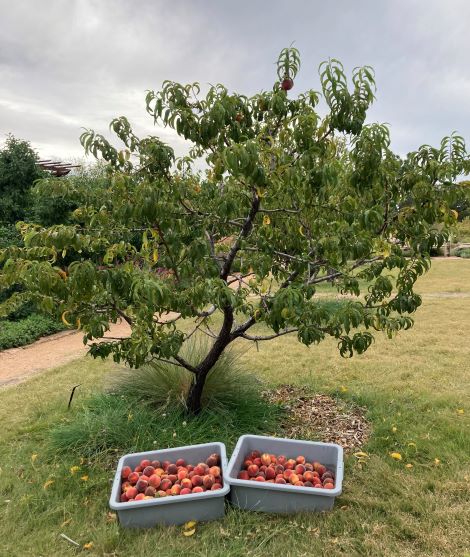
Photo by Gabi Baird, Youth Gardener Internship Program Coordinator
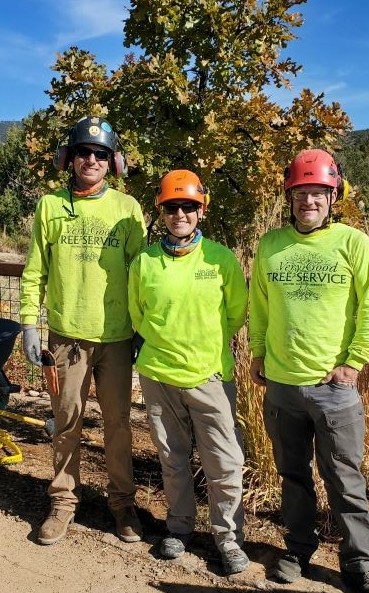
Very Good Tree Service working on tree planting area restoration in 2021.
The Horticulture staff and trained volunteers practice year round organic integrated pest management in both the cultivated gardens and the more naturalistic Piñon-Juniper Woodland. Our collection management includes: horticultural practices to prevent pests, regular monitoring and observations, verified identification of any pests or diseases, documentation and records stored in plant database, consultation with staff, contractors, and local extension agents, appropriate application of the least toxic controls possible when needed, monitoring and reporting to local and state diagnostic labs, and if needed plant removal and restoration of planting areas.
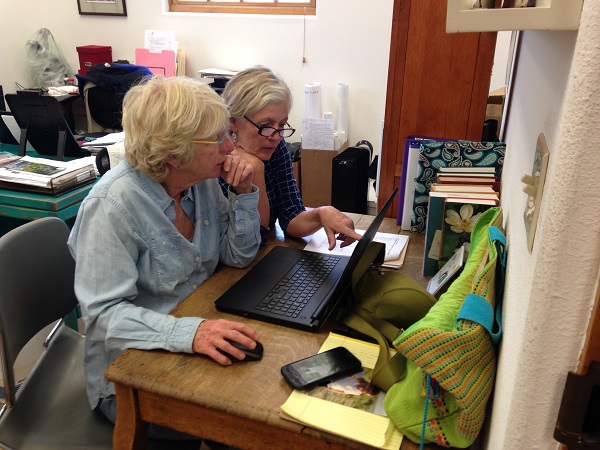
Volunteers recording updating plant database.
Using chemicals or other substances is never our first line of defense against actual or potential pests. For example, we have observed aphids in our rose garden and on our yuccas in early summer, but we choose not to “treat” the aphids with anything that may cause them to develop pesticide resistance or that may damage populations of potential aphid predators. As a result, the aphids attract birds, lizards, beneficial insects and other animals which quickly control the aphid populations. Many of these aphid predators are also charismatic animals in our Garden, so by allowing natural environmental controls we have the added benefit of attracting our human visitors.
Any chemical or biological controls used are OMRI-approved and the least environmentally-damaging options possible. We do not use systemic insecticides, which can have devastating effects on a wide range of insect (and other) life. The substances we do use are only applied by staff, trained gardening volunteers, or when necessary, by licensed contractors. We have determined we need to use controls in a few areas of our garden management, especially in the health of our native piñon pine trees, and in rose care.
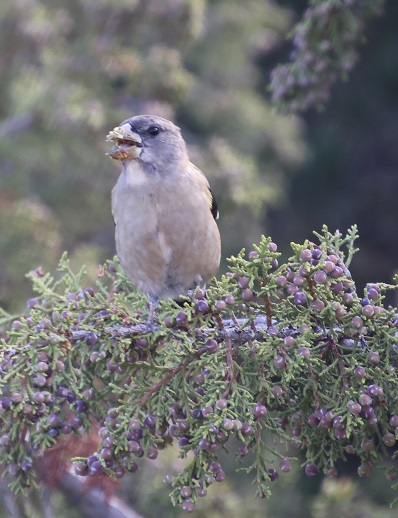
Photo by Toby Kessler, Master Naturalist Volunteer.
We work with an experienced local pesticide contractor to spray the trees with dormant oil in late winter or very early spring, for control of piñon needle scale which is devastating entire woodlands in our area. We find that by applying the dormant oil very early in the season, and early on non-windy days, there is little collateral damage as bees and most beneficial insects are still dormant at that time. The oil, when correctly applied, does not damage birds or mammals. As a result, the piñon pines that we have sprayed on our property are much healthier than many in the surrounding areas of Santa Fe, and the piñons themselves support an enormous variety of life in our local ecosystem. These healthier piñons are also, therefore, much less susceptible to a pest that’s even more devastating and harder to control, the piñon bark beetle.
Our roses, although very healthy for the most part, do develop powdery mildew in early summer. We have found that by treating them weekly through spring with, alternately, neem oil and potassium bicarbonate, we can greatly reduce the prevalence of the mildew. As with the piñon spraying, we make applications very early in the morning on still days, so as to minimize any collateral damage. We have noted healthy populations of lady beetles, preying mantis, and minute pirate bugs, among other beneficial insects, on our roses all summer, so we feel our treatments pay off by creating healthy plants which support a variety of life.
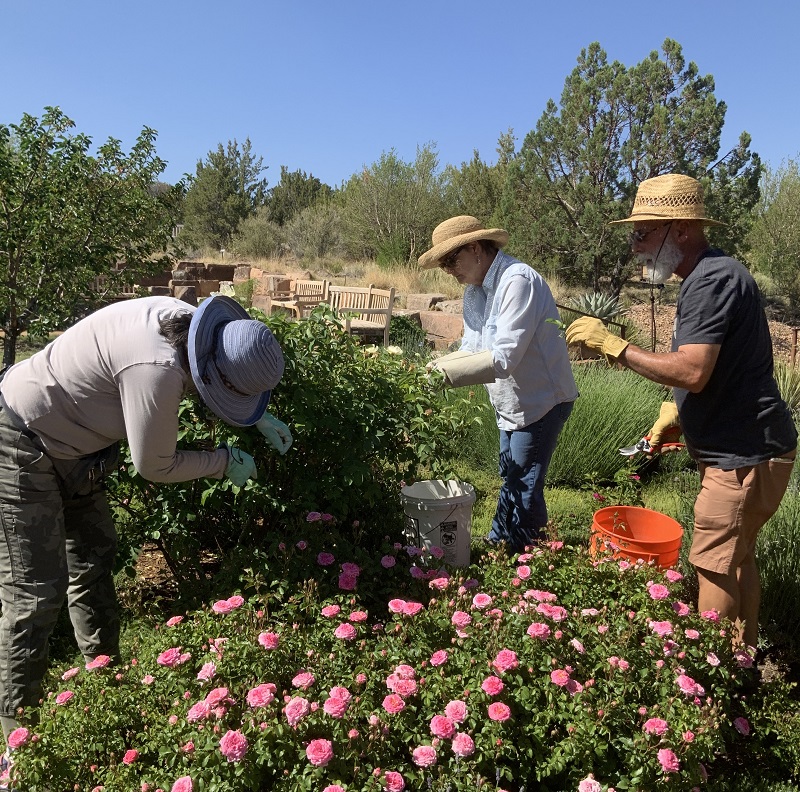
We do not use herbicides in our garden. We have a robust volunteer gardening force whose work includes mechanical weeding and plant removal as needed. We have not found we need to use chemicals to replace this willing labor. We believe there are too many potential negative side effects to the environment, including humans, to support the use of such chemicals.
It is our intention to keep our Piñon-Juniper Woodland as close to a “native” state as possible, in order to share the experience of our regional woodland biome with visitors from both near and far. Our management of the plant collection will likely be minimal and will certainly include very little, if any, use of pesticides or other killing agents. In fact, we had rather our Garden model an appreciation, even celebration, of all life, which we will continue to support through our garden management practices.

Watercolor by Lisa Flynn, www.lisaflynnfineart.com.


